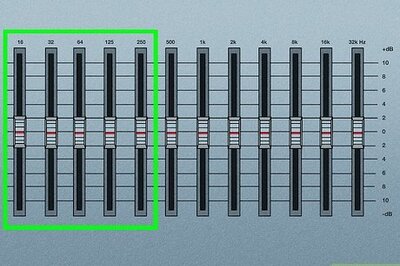
views
Preparing for Your Period

Reframe your mindset about your period. Many people dread the arrival of their period and think of it as something they have to suffer through. During your menstrual cycle, the actual hormones in your brain change and can affect your mood, but you can also consciously change the way you think about your period. It can be empowering to think of your period as a symbol of adulthood and as natural part of your life. Your first period, called menarche, is often celebrated 'as a young person's entrance into adulthood.' If you realize that your period can be something that is celebrated, you might stop dreading its arrival and cope with it. Have something to look forward to on your period. For example, you may want to cook your favorite meal on your period, or buy yourself a magazine when you get your period.

Keep track of your period. Tracking your menstrual cycle will not only give you a heads-up when your period is due, but it can also help you know when you are fertile and can get pregnant. Getting your period unexpectedly can leave you feeling unprepared and stressed. You can keep track of the day your period starts and end with a calendar, in a journal, or with an app for your mobile devices. There are several apps, such as Strawberry Pal or Clue, that can help you track your period and set reminders for when your next cycle is about to start. Remember that during your first year, periods are often unpredictable and come at random. They can also skip. This is completely normal. However, after the first year, your period should begin to follow a more regular pattern and be easier to track. Menstrual cycles vary from person to person. They can last anywhere from 21 to 35 days, and your period may last two to seven days. Your period may be regular and occur at the same time each month, or it may be irregular. Keeping track of your period is very important when you are sexually active. It helps you to determine when you are the most fertile, which is important to know whether you want to avoid pregnancy or when you want to become pregnant.

Keep menstrual products with you at all times. Keep an extra tampon, pantyliner, or pad in your purse, backpack, and car. This way, if you get your period and you do not have access to other menstrual products you are still protected. This is especially important if your periods are irregular and you are not able to accurately predict when your next period will begin. You should also keep some change with you, just in case you are caught off guard and need to purchase a pad/tampon. It’s a good idea to keep a few extra menstrual hygiene products with you so you can offer one to another person if they need one. Wearing period underwear, or a pantyliner can help prevent any leaks if you weren't aware your period has started. You can also get reusable pantyliners. EXPERT TIP Alicia Oglesby Alicia Oglesby Professional School Counselor Alicia Oglesby is a Professional School Counselor and the Director of School and College Counseling at Bishop McNamara High School outside of Washington DC. With over ten years of experience in counseling, Alicia specializes in academic advising, social-emotional skills, and career counseling. Alicia holds a BS in Psychology from Howard University and a Master’s in Clinical Counseling and Applied Psychology from Chestnut Hill College. She also studied Race and Mental Health at Virginia Tech. Alicia holds Professional School Counseling Certifications in both Washington DC and Pennsylvania. She has created a college counseling program in its entirety and developed five programs focused on application workshops, parent information workshops, essay writing collaborative, peer-reviewed application activities, and financial aid literacy events. Alicia Oglesby Alicia Oglesby Professional School Counselor Be prepared for your period. Assemble a discreet “period bag” to keep in your locker with pads, tampons, fresh underwear, and any other supplies you may need. This way, you'll be prepared when the time comes to deal with it.

Eat iron-rich foods. During ovulation, which happens 12 to 16 days before your period begins, your body is preparing for a potential pregnancy. Your body releases two different hormones, progesterone and estrogen, which tell your body that it should prepare for pregnancy. Your metabolism speeds up during this time so you’ll need to eat more calories than you usually do. Eat plenty of iron-rich foods to help offset the iron that you’ll lose right before and during your period. Meat, beans, lentils, eggs, and dark leafy greens are all good sources of iron. You should continue to eat iron-rich foods during your period. This can help to relieve some period symptoms, like fatigue and cramping. Vitamin C can improve your body's absorption of iron. Try to eat foods rich in Vitamin C, such as oranges, peppers, and kale, as well.
Minimizing Pain and Discomfort

Stay hydrated. Many people feel bloated and uncomfortable during their period. You can help offset bloating by drinking lots of fluids. Try to limit the amount of caffeine, alcohol, and sugary drinks that you consume. Drinking plenty of fluids, especially water, is a good way to help alleviate bloat. Try to avoid carbonated drinks during your period as they can increase bloating.

Take pain medication. Many people experience some level of pain during their periods. Usually, this pain is related to cramping as the uterine wall contracts. You can take over-the-counter pain medications, like ibuprofen, acetaminophen, and aspirin to help manage your pain. These medications can be found at any drug store, and you should always follow the manufacturer’s recommendation for dosages. Talk to your physician if over-the-counter painkillers do not work and you continue to have severe pain during cramps.

Use heat to soothe cramps. Heat helps to relax the muscles in your abdomen when you have cramps. You can take a heating pad or a hot water bottle and place it over your stomach where the pain is, or take a warm bath or shower. Massaging your lower abdomen in light, circular motions may also help to soothe pain.

Adjust your diet. During your period, you may find that you are craving different foods. Unfortunately, salty, sugary, and processed foods can make cramping more painful. The foods you eat should be nutritious and give you energy throughout the day. You may be craving a certain treat, like chocolate or ice cream, and it’s okay to give into that craving and have some, as long as it is in moderation. Foods high in potassium, like bananas and leafy greens, can help alleviate bloating naturally. Eat plenty of foods that are rich in calcium, like beans, almonds, and dairy. There is, however, evidence showing that having some dark chocolate can help relieve symptoms. Make sure you are still consuming enough calories, or you could end up feeling dizzy or tired.

Manage nausea. Many people feel nauseous during their periods, which can be very uncomfortable. Changes in your hormone levels can lead to gastrointestinal distress, such as diarrhea, or you may feel nauseous as a result of pain from cramps or headaches. While you may have lost your appetite, try to eat bland foods like white rice, apples, and toast, that will settle your stomach. Ginger, either in teas, supplements, or in its root form, is a natural way to relieve nausea as well. Treat your nausea with over-the-counter medications, especially nonsteroidal anti-inflammatory drugs (NSAIDs), such as naproxen or ibuprofen. These can help period-related nausea by preventing the production of a hormone called prostaglandins, which may be the cause of your nausea.

Engage in physical activity. Exercise is a great way to naturally manage your pain. When you exercise your body releases mood-boosting endorphins, which can alleviate pain and keep your mind off your period-related discomfort. You may want to do a less strenuous workout than your normal routine if you have pain. Light exercise that warms up your core, like yoga, can also help to minimize bloating. Feel free to skip the gym if you really aren’t feeling up for it. While exercising can help you manage your symptoms, you don’t need to force yourself to exercise.

Talk to your doctor if your symptoms are unmanageable. While some pain and discomfort are normal during your period, you may need to consult your doctor if your symptoms are unmanageable. You can talk to your primary care physician or your gynecologist about these issues, and they may recommend that you see a specialist. They might be able to prescribe pain medication, make recommendations to change your lifestyle, or suggest you take oral contraceptives. You should see your doctor if you are spotting in between periods, you have a very heavy flow, very painful cramps, or if your flow lasts more than 10 days.
Caring for Yourself

Get plenty of rest. During your period, you may feel more tired than you normally do. Pain and discomfort from cramps and bloating can make it more difficult to sleep, while fatigue actually lowers your pain tolerance. Try to sleep at least eight hours during the night and take a nap during the day if you need to. Light exercises, like meditating, practicing yoga, and stretching can help you to sleep better. Your core body temperature rises during your period, making you feel warmer. Feeling warm can make sleeping difficult so keep the temperature in your bedroom between 60 and 67 degrees Fahrenheit, or 15.5 to 19 degrees Celsius.

Wear comfortable clothes. Most people prefer not to wear tight, close-fitting, or otherwise uncomfortable clothing while they have their period. You should wear what you feel most comfortable in when you have the opportunity. People who are bloated might prefer to wear looser tops or pants with an elastic waistband.

Wear appropriate underwear. During your period, you should wear underwear that you don’t mind getting messy. Even when you use the right menstrual hygiene products, you may leak onto your underwear. Some people like to have a few pairs of underwear that they only wear during their periods. You may be more comfortable wearing full coverage bikini briefs, rather than thongs, during your period, especially if you are wearing a pad. Try to get cotton underwear for your period. Not only is it comfortable, but it may be able to reduce your risk of yeast infections. Stains are less noticeable on darker-colored underwear. Your underwear should be cotton, which allows the area to breathe and is gentler on the skin. Period underwear is also a good idea, either with another product if your period is heavier, or without when your period is lighter.

Find ways to relax. Periods can add to your stress and be an inconvenience. Give yourself time to unwind after a day out and find a quiet space to gather your thoughts and feelings. Find ways to relax and take your mind off any pain or discomfort that you may be feeling. Do the things that make you happy. For instance, listen to your favorite songs and artists and have a dance party in your room. Find activities that you find relaxing or soothing, like meditating, writing in a journal, drawing, listening to soothing music, or watching television. Aromatherapy may also help you relax. Try using sage, lavender, or rose essential oils.

Anticipate mood changes during your period. Hormonal changes can affect your mood during your period. For instance, you may feel sad, anxious, or irritable about situations that normally don’t impact you. Be aware that if you are feeling upset about something, your emotions might be related to your hormones rather than how you truly feel. You may want to avoid making big decisions during this time or avoid confrontation. You can write down your emotions each day during your period to see if you notice that you feel sadder or more anxious during this time. If you are experiencing extreme mood swings or have any thoughts about harming yourself contact your doctor immediately. You may be suffering from a condition called Premenstrual Dysphoric Disorder, which can significantly impact your mood.

Change your menstrual product whenever you feel the need. Pads should be changed every 4-8 hours and tampons should be changed every 4-6 hours. Never leave a tampon in for longer than eight hours; this increases your risk of developing toxic shock syndrome (TSS). You can leave a menstrual cup in for more than twelve hours, and this is the most environmentally friendly option. Changing your menstrual product can help you to feel fresh and more confident that you won’t leak. You may need to change your menstrual product more frequently if you have a heavier flow or if it is the first few days of your period. TSS is a serious and life-threatening bacterial infection. If you begin to have a rash that resembles a sunburn, especially on your palms and soles, a high fever, low blood pressure, or begin vomiting contact a medical professional.




















Comments
0 comment